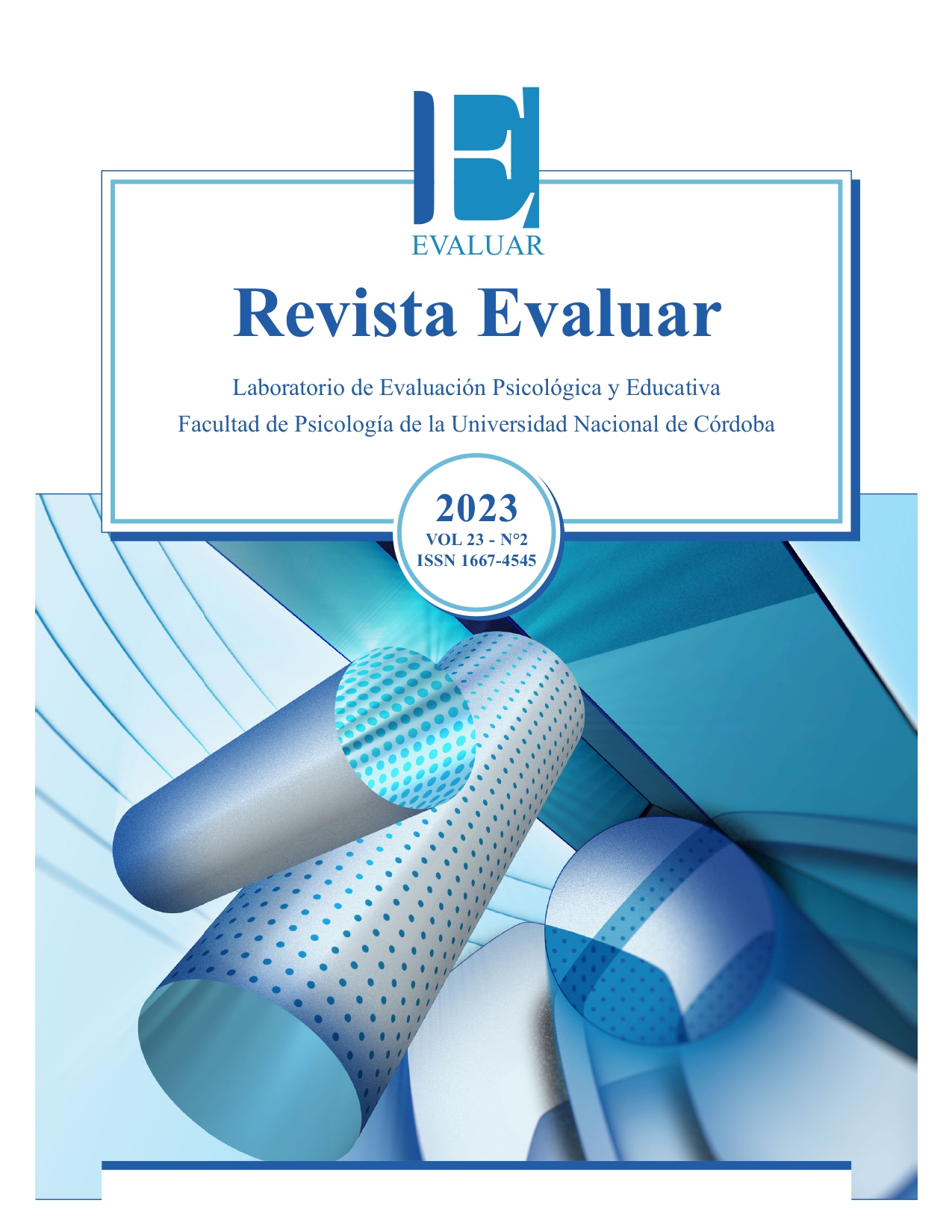Assessment of Breastfeeding Engagement in Postpartum Women with the UWES-17 scale
DOI:
https://doi.org/10.35670/1667-4545.v23.n2.42066Keywords:
breastfeeding, puerperal women, psychometrics, maternal and child health, self-reportAbstract
Promotion and monitoring of breastfeeding require reliable and valid instruments that allow studying the engagement of itself. Thus, the aim of this study was to analyze the psychometric properties of the Utrecht Work Engagement Scale (UWES-17) for the assessment of engagement in breastfeeding practices among 324 postpartum Argentinian women. The UWES-17, Breastfeeding
Self-Efficacy Scale, Postpartum Depression Scale, and a sociodemographic questionnaire were applied. Moreover, reliability, validity, dimensionality, sensitivity, and specificity were analyzed. The UWES-17 demonstrated adequate levels of internal consistency, and its three-dimensional structure was confirmed. Bifactorial analysis supported its usage, and the model verified its external validity. The results validate the UWES-17 as a valid and reliable tool for assessing breastfeeding engagement, thus making it suitable for implementation in clinical and scientific contexts to support interdisciplinary approaches to breastfeeding.
Downloads
References
Adamson, K. A., & Prion, S. (2013). Reliability: Measuring internal consistency using Cronbach’s α. Clinical Simulation in Nursing, 9(5), e179-e180. https://doi.org/10.1016/j.ecns.2012.12.001
Avilla, J. C., Giugliani, C., Bizon, A. M. B. L., Martins, A. C. M., Senna, A. F. K., & Giugliani, E. R. J. (2020). Association between maternal satisfaction with breastfeeding and postpartum depression symptoms. Plos One, 15(11), e0242333. https://doi.org/10.1371/ journal.pone.0242333
Borra, C., Iacovou, M., & Sevilla, A. (2015). New evidence on breastfeeding and postpartum depression: The importance of understanding women’s intentions. Maternal and Child Health Journal, 19(4), 897-907. https://doi.org/10.1007/s10995-014-1591-z
Carrizo, E., Domini, J., Quezada, R. Y. J., Serra, S. V., Soria, E. A., & Miranda, A. R. (2020). Variaciones del estado cognitivo en el puerperio y sus determinantes: Una revisión narrativa. Ciência & Saúde Coletiva, 25(8), 3321-3334. https://doi.org/10.1590/1413-81232020258.26232018
Chambers, J. A., McInnes, R. J., Hoddinott, P., & Alder, E. M. (2007). A systematic review of measures assessing mothers’ knowledge, attitudes, confidence and satisfaction towards breastfeeding. Breastfeeding Review, 15(3), 17-25.
Chan, E. K. H. (2014). Standards and guidelines for validation practices: Development and evaluation of measurement instruments. In B. D. Zumbo & E. K. H. Chan (Eds.), Validity and validation in social, behavioral, and health sciences (9-24). Springer International Publishing.
Chang, P. C., Li, S. F., Yang, H. Y., Wang, L. C., Weng, C. Y., Chen, K. F., & Fan, S. Y. (2019). Factors associated with cessation of exclusive breastfeeding at 1 and 2 months postpartum in Taiwan. International Breastfeeding Journal, 14(1), 1-7. https://doi.org/10.1186/s13006-019-0213-1
Chrzan-Dętkoś, M., Walczak-Kozłowska, T., Pietkiewicz, A., & Żołnowska, J. (2021). Improvement of the breastfeeding self-efficacy and postpartum mental health after lactation consultations – Observational study. Midwifery, 94, 102905. https://doi.org/10.1016/j.midw.2020.102905
Corno, G., Espinoza, M., & Baños, R. M. (2019). A narrative review of positive psychology interventions for women during the perinatal period. Journal of Obstetrics and Gynaecology, 39(7), 889-895. https://doi.org/10.1080/01443615.2019.1581735
Ghasemi, V., Simbar, M., Banaei, M., Naz, M. S. G., Jahani, Z., & Nazem, H. (2019). The effect of interventions on breastfeeding self-efficacy by using Bandura’s theory in Iranian mothers: A systematic review. International Journal of Pediatrics, 7(8), 9939-9954. https://ijp.mums.ac.ir
Girard, L. C., Côté, S. M., de Lauzon-Guillain, B., Dubois, L., Falissard, B., Forhan, A., Doyle, O., Bernard, J. Y., Heude, B., Saurel-Cubizolles, M. J., Kaminski, M., Boivin, M., Tremblay, R. E., & Eden Mother-Child Cohort Study Group. (2016). Factors associated with breastfeeding initiation: A comparison between France and French-speaking Canada. PloS One, 11(11), e0166946. https://doi.org/10.1371/journal.pone.0166946
Gómez-Garbero, L., Labarthe, J., Ferreira-Umpiérrez, A., & Chiminelli-Tomás, V. (2019). Evaluación del engagement en trabajadores de la salud en Uruguay a través de la Escala Utrecht de Engagement en el Trabajo (UWES). Ciencias Psicológicas, 13(2), 305-316. https://doi.org/10.22235/cp.v13i2.1888
Guillén, F., & Martínez-Alvarado, J. R. (2014). The sport engagement scale: An adaptation of the Utrecht Work Engagement Scale (UWES) for the sports environment. Universitas Psychologica, 13(3), 975-984. https://doi.org/10.11144/Javeriana.UPSY13-3.sesa
Hair Jr, J. F., Howard, M. C., & Nitzl, C. (2020). Assessing measurement model quality in PLS-SEM using confirmatory composite analysis. Journal of Business Research, 109, 101-110. https://doi.org/10.1016/j.jbusres.2019.11.069
Le, H. N., Perry, D. F., & Ortiz, G. (2010). The Postpartum Depression Screening Scale-Spanish version: Examining the psychometric properties and prevalence of risk for postpartum depression. Journal of Immigrant and Minority Health, 12(2), 249-258. https://doi.org/10.1007/s10903-009-9260-9
Miranda, A. R., Scotta, A. V., Cortez, M. V., & Soria, E. A. (2021). Triggering of postpartum depression and insomnia with cognitive impairment in Argentinian women during the pandemic COVID-19 social isolation in relation to reproductive and health factors. Midwifery, 102, 103072. https://doi.org/10.1016/j.midw.2021.103072
Miranda, A. R., Scotta, A. V., Méndez, A. L., Serra, S. V., & Soria, E. A. (2020). Public sector workers’ mental health in Argentina: Comparative psychometrics of the Perceived Stress Scale. Journal of Preventive Medicine and Public Health, 53(6), 429-438. https://doi.org/10.3961/jpmph.20.229
Morin, A. J. S., Myers, N. D., & Lee, S. (2020). Modern factor analytic techniques: Bifactor models, exploratory structural equation modeling (ESEM), and bifactor‐ESEM. En G. Tenenbaum, R. C. Eklund (Eds), Handbook of Sport Psychology (1044-1073). https://doi.org/10.1002/9781119568124.ch51
Nanishi, K., Green, J., Taguri, M., & Jimba, M. (2015). Determining a cut-off point for scores of the Breastfeeding Self-Efficacy Scale-Short Form: Secondary data analysis of an intervention study in Japan. PloS One, 10(6), e0129698. https://doi.org/10.1371/journal.pone.0129698
Olivera, M., Prozzillo, P., & Simkin, H. A. (2023). Listado de Evaluación del Soporte Interpersonal (LESI-12): Evidencias de validez y confiabilidad en el contexto argentino. Revista Evaluar, 23(1), 1-11. https://revistas.unc.edu.ar/index.php/revaluar/issue
Oliver-Roig, A., d’Anglade-González, M. L., García-García, B., Silva-Tubio, J. R., Richart-Martínez, M., & Dennis, C. L. (2012). The Spanish version of The Breastfeeding Self-efficacy Scale-short form: Reliability and validity assessment. International Journal of Nursing Studies, 49(2), 169-173. https://doi.org/10.1016/j.ijnurstu.2011.08.005
Provenzi, L., Fumagalli, M., Bernasconi, F., Sirgiovanni, I., Morandi, F., Borgatti, R., & Montirosso, R. (2017). Very preterm and full‐term infants’ response to socio‐emotional stress: The role of postnatal maternal bonding. Infancy, 22(5), 695-712. https://doi.org/10.1111/infa.12175
Reise, S. P., Morizot, J., & Hays, R. D. (2007). The role of the bifactor model in resolving dimensionality issues in health outcomes measures. Quality of Life Research, 16, 19-31. https://doi.org/10.1007/s11136-007-9183-7
Roelen, C. A. M., van Hoffen, M. F. A., Groothoff, J. W., de Bruin, J., Schaufeli, W. B., & van Rhenen, W. (2015). Can the Maslach Burnout Inventory and Utrecht Work Engagement Scale be used to screen for risk of long-term sickness absence? International Archives of Occupational and Environmental Health, 88(4), 467-475. https://doi.org/10.1007/s00420-014-0981-2
Schaufeli, W. B. (2013). What is engagement? In C. Truss, K. Alfes, R. Delbridge, A. Shantz, & E. Soane (Eds.), Employee Engagement in Theory and Practice (pp. 15-35). Routledge.
Schaufeli, W. B., & Bakker, A. B. (2004). Job demands, job resources, and their relationship with burnout and engagement: A multi‐sample study. Journal of Organizational Behavior, 25(3), 293-315. https://doi.org/10.1002/job.248
Schaufeli, W. B., Salanova, M., González-Romá, V., & Bakker, A. B. (2002). The measurement of engagement and burnout: A two sample confirmatory factor analytic approach. Journal of Happiness Studies: An Interdisciplinary Forum on Subjective Well-Being, 3(1), 71-92. https://link.springer.com/journal/10902
Smorti, M., Testa, I., Gallese, M., Dotti, A., Ionio, C., Andreol, A., Zilioli, A., Pravettoni, G., Greco, A., Fenaroli, V., Nastasi, G., Giuntini, N., & Bonassi, L. (2020). Protect, promote and support: A warm chain of breastfeeding for oncological women-results from a survey of young Italian cancer mothers. Ecancermedicalscience, 14. https://doi.org/10.3332/ecancer.2020.1151
Wickramasinghe, N. D., Dissanayake, D. S., & Abeywardena, G. S. (2018). Validity and reliability of the Utrecht Work Engagement Scale-student version in Sri Lanka. BMC Research Notes, 11(1), 1-6. https://doi.org/10.1186/s13104-018-3388-4
World Health Organization. (2001). Global strategy for in fant and young child feeding. The optimal duration of exclusive breastfeeding. 54 World Health Assembly. Geneva. https://apps.who.int/iris/handle/10665/78801
Wouk, K., Tucker, C., Pence, B. W., Meltzer-Brody, S., Zvara, B., Grewen, K., & Stuebe, A. M. (2020). Positive emotions during infant feeding and breastfeeding outcomes. Journal of Human Lactation, 36(1), 157-167. https://doi.org/10.1177/0890334419845646
Zimmerman, B. J., Kitsantas, A., & Campillo, M. (2005). Evaluación de la autoeficacia regulatoria: Una perspectiva social cognitiva. Revista Evaluar, 5(1), 01-21. https://doi.org/10.35670/1667-4545.v5.n1.537
Downloads
Published
How to Cite
Issue
Section
License

This work is licensed under a Creative Commons Attribution 4.0 International License.
Revista Evaluar aplica la Licencia Internacional de Atribuciones Comunes Creativas (Creative Commons Attribution License, CCAL). Bajo esta licencia, los autores retienen la propiedad de copyright de los artículos pero permiten que, sin que medie permiso de autor o editor, cualquier persona descargue y distribuya los artículos publicados en Evaluar. La única condición es que siempre y en todos los casos se cite a los autores y a la fuente original de publicación (i.e. Evaluar). El envío de artículos a Evaluar y la lectura de los mismos es totalmente gratuito.




_(3).jpg)



.jpg)



